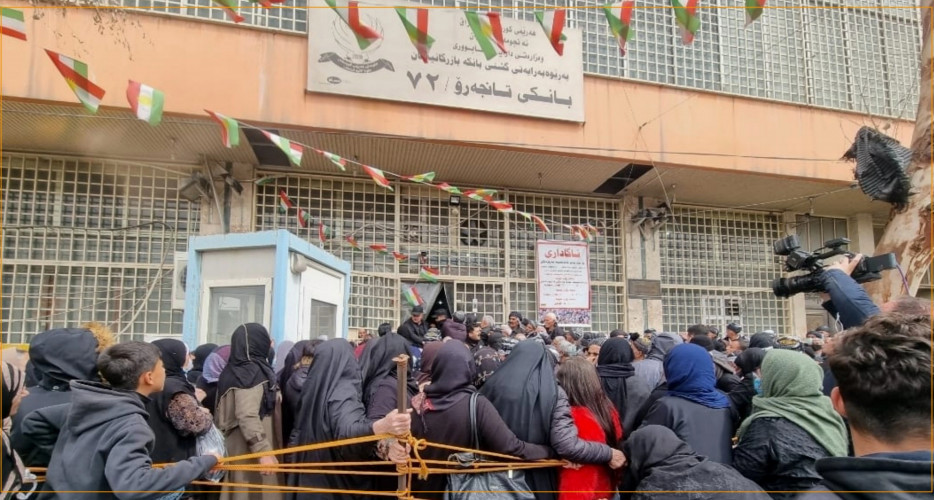
PEREGRAF
The Kurdistan Regional Government (KRG) is facing legal problems due to its refusal to pay legally mandated social benefits to pensioners, leaving elderly residents vulnerable and potentially unable to support themselves.
Five months ago, Iraq’s Federal Supreme Court ruled that the KRG should use a reformed federal pensions law passed nine years ago to pay retirement benefits, but Erbil has ignored the ruling and has no plans to implement it.
Erbil continues to use an old law, the Iraqi Pension Law No. 27 of 2006, which authorizes payments of 220,000 Iraqi dinars ($168) per month.
This pays about half the amount of the new federal version, the Unified Pension Law No. 9 of 2014, which gives pensioners a minimum of 500,000 Iraqi dinars $382 per month and their full salary for the 12 months after they leave government service.
"There are many differences between the two laws," Sadiq Osman Arif, spokesperson for the Kurdistan Pensioners Union, told Peregraf.
"There are many other privileges in the newer law, such as travel facilities, health care, and land. In the Kurdistan Region, we are not always paid our benefits. Until now, we have not been paid in full 21 times and payments used to be docked by 21 percent," Arif said, referring to austerity measures implemented by the KRG since 2014.
In order to remedy this disparity between how the elderly are treated by Baghdad and Erbil, pensioners in the Kurdistan Region filed a lawsuit against KRG Prime Minister Masrour Barzani and Finance Minister Awat Sheikh Janab in federal court.
On November 23, 2022, the court found in the pensioners’ favor, ruling that the use of Law 27 of 2006 was unconstitutional and that the KRG must comply with Law 9 of 2014. The ruling was in part based on Article 130 of the 2005 Constitution, which states that laws only remain in force until they are "annulled or amended."
According to Article 94 of the Constitution, "decisions of the Federal Supreme Court are final and binding for all authorities."
Arif said that the Kurdistan Pensioners Union has been advocating for the newer law to be used in the Kurdistan Region since it was passed, but the KRG’s ailing finances prevented that from happening.
There are approximately 250,000 pensioners in the Kurdistan Region, although there are questions about whether that number includes some who are included fraudulently. Even using a law that is decidedly less generous to pensioners, the KRG has been unable to meet its financial obligations to elderly citizens.
"We have submitted a petition with 13,000 signatures to the government, the presidency, and the parliament, but they have not responded. If they do not respond, we will take civil action after Ramadan," he warned.
A source in the KRG Ministry of Finance told Peregraf on condition of anonymity that "any law with financial obligations is not easy to implement because the Kurdistan Region itself is in crisis, so any decision issued in [Baghdad] is not necessarily implemented as it is."
"The Kurdistan Region still has problems with the distribution of salaries, budget from Baghdad and low domestic revenue, so the implementation of the [federal court] decision must happen in a situation where the budget is coming from Baghdad and we are in a normal financial situation," the ministry source added.
The source also stressed that the laws of the Kurdistan Region mandate that any new legislation that comes with financial obligations must be approved both by the KRG cabinet and the Kurdistan Parliament.
"In the past, we tried to implement [Law 9 of 2014] in the Kurdistan Region, but the KRG told us that they are preparing a pensions bill that will be used in the Kurdistan Region," Ziad Jabar, chair of the Kurdistan Parliament’s Finance Committee, told Peregraf.
Under the constitution, the Kurdistan Region can either apply federal laws or have the Kurdistan Parliament pass its own legislation.
"For a long time, the KRG did not send its own bill to parliament to work on and did not apply the Iraqi law," Jabar added.
The KRG has ignored several other recent decisions by federal courts, including one issued in February 2022 that the Kurdistan Region’s oil and gas law was unconstitutional.
A source in the Iraqi parliament told Peregraf on condition of anonymity that if the KRG does not apply the federal court decision, the pensioners can first apply civil pressure, but then can go back to the court.
"According to the constitution, the federal government is responsible for formulating fiscal policy and the issue of [pensions] falls within the framework of fiscal policy," the source said.
"The Kurdistan Region has no law on salaries, whether civil or military, so they implement all federal laws," the source added.